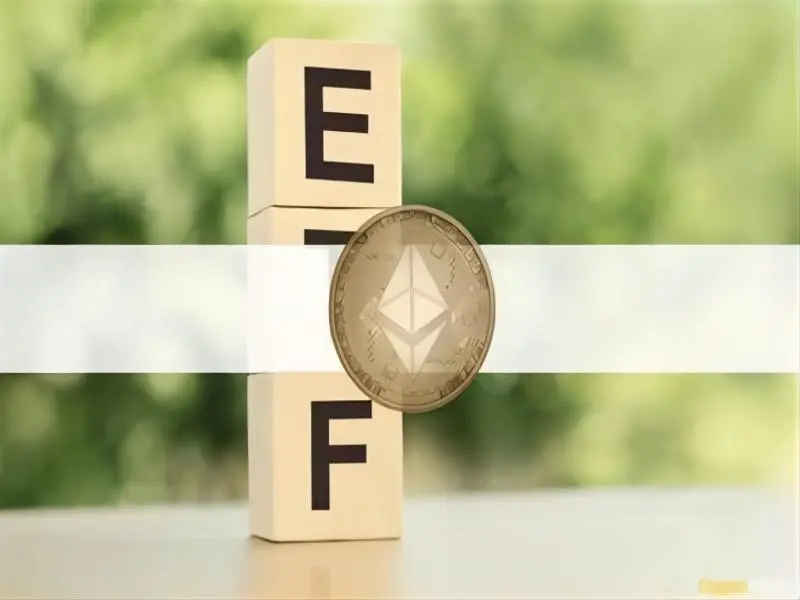- The goal of an Ethereum ETF, also known as an ether ETF, is to track the price of ether, the cryptocurrency that is second only to bitcoin in terms of market capitalisation.
- The key distinction between Ethereum (ETH) and an Ethereum ETF lies in ownership and trading.
- If ether ETFs are approved, they might function similarly to other ETFs, providing investors with a convenient and regulated means of being exposed to changes in Ethereum’s price without having to hold the cryptocurrency directly.
Ethereum is a blockchain network on which decentralised applications, contracts and other cryptocurrency-based services are built. Its native token, ether (ETH), is the second-most valuable cryptocurrency by market capitalisation. While they are distinct concepts, “ether” and “Ethereum” are often used interchangeably as the name of the token.
An Ethereum ETF, or ether ETF, is an exchange-traded fund that seeks to track the price of ether, which is the second-largest cryptocurrency in market capitalisation behind bitcoin. Most Ethereum ETFs track the price movement of ETH by holding futures contracts. This structure enables investors to gain exposure to ether without having to buy or store the cryptocurrency.
What is Ethereum ETF?
Ethereum ETF (Exchange-Traded Fund) is a type of investment vehicle that tracks the price of ether, the cryptocurrency used on the Ethereum blockchain. These funds are traded on stock exchanges, much like stocks, and allow investors to gain exposure to the cryptocurrency market without the need to buy, hold, or manage the cryptocurrency directly.
It’s important to note that while Ethereum ETFs offer a regulated and accessible way to invest in ether, they are still subject to regulatory approval and may come with their own set of risks and considerations for investors. The key distinction between Ethereum (ETH) and an Ethereum ETF lies in ownership and trading. When investors hold Ethereum, they possess the actual cryptocurrency and can store it in a digital wallet for transactions or investment purposes. Investors in an Ethereum ETF own shares in the fund with Ethereum or derivatives linked to the asset. This difference allows ETF investors to capitalise on changes in ether’s price without directly holding the cryptocurrency.
Ethereum ETFs offer a convenient and regulated way for investors to invest in ether. They are supervised by financial watchdogs, providing more protection and transparency than directly holding cryptocurrencies.
Investors can use these ETFs to diversify their portfolios and benefit from the growth of ether. The liquidity of these ETFs is a major advantage, allowing investors to trade shares throughout the trading day on stock exchanges.
While Ethereum transactions occur 24/7 in the cryptocurrency market, Ethereum ETFs adhere to trading day restrictions similar to traditional investment products, operating exclusively on weekdays. This discrepancy in trading hours offers a more familiar trading experience for investors accustomed to conventional stock market hours.
Also read: How many Regional Internet Registries (RIRs) are there?
How Ethereum ETF would work?
If ether ETFs get approval, they may operate similarly to other ETFs, offering investors a regulated and convenient way to gain exposure to Ethereum’s price movements without directly holding the cryptocurrency.
Here’s how Ethereum ETFs would function if approved.
Investment structure: Ethereum ETFs would be structured as investment funds holding ether (ETH) or derivatives linked to the cryptocurrency. Investors would acquire shares of the ETF, representing ownership of the underlying assets held by the fund.
Trading on stock exchanges: These ETFs would be listed and traded on traditional stock exchanges, expanding accessibility to a broader investor base unfamiliar with cryptocurrency exchanges. This regulated avenue would offer a familiar and accessible investment opportunity for those interested in Ethereum.
Also read: What is open banking? A short guide
Price tracking: The ETF’s price would closely track the price of ether, enabling investors to capitalise on Ethereum’s value fluctuations without managing digital wallets or navigating cryptocurrency exchanges. This streamlined approach would simplify Ethereum investment for retail and institutional investors alike.
Liquidity and market impact: Approval of ether ETFs could enhance liquidity in the Ethereum market by attracting more participants. Increased liquidity may lead to more stable prices and reduced volatility, making Ethereum a more appealing investment for a wider audience.
Dividend potential: Unlike spot Bitcoin ETFs, Ethereum ETFs might have dividend potential from staking rewards. However, this feature would hinge on the ETF’s specific structure, investment strategy and regulatory constraints on dividend disbursements.
An Ethereum ETF is designed to offer exposure to ether (ETH), the native cryptocurrency of the Ethereum blockchain network. Unlike directly purchasing ether on a cryptocurrency exchange, an Ethereum ETF enables investors to track ether’s price movements without owning the digital asset itself. This type of investment vehicle mirrors the price of ether and is traded on traditional stock exchanges, making it more accessible to investors who may not be familiar with cryptocurrency exchanges.

